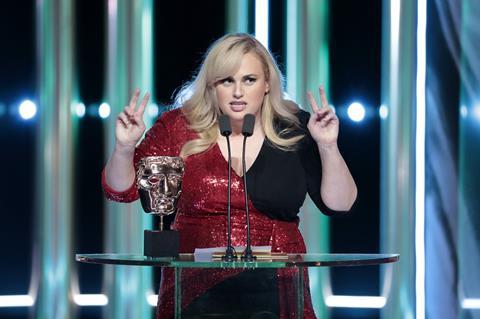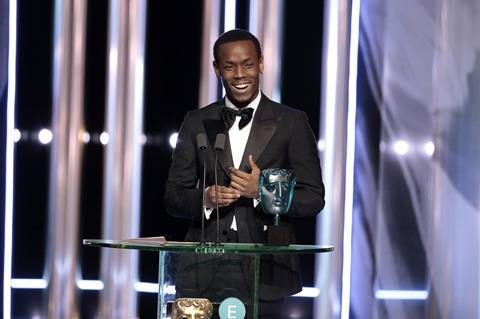Screen analyses this year’s Bafta film awards, which saw 1917 emerge triumphant at last night’s ceremony (2 Feb).

1917 marches on to Oscar glory
1917 blew away the competition last night, winning seven awards compared to three for Joker and two for Parasite. Of the other major frontrunners, Once Upon A Time… In Hollywood won just one award from 10 nominations for Brad Pitt as best supporting actor, while Martin Scorsese’s The Irishman came away empty-handed, also from 10 nods (more below).
Sam Mendes’ First World War film is now the red-hot favourite for best picture at the Oscars, voting ballots for which are due in tomorrow (February 4). 1917 has all the momentum following wins at the Golden Globes, the DGA and PGA awards. The fact the film is an unashamed celebration of the theatrical experience – see the canny marketing focus on its “must-see on the big screen” one-take visuals – could also be making it popular with awards voters wary of the rise of streamers. Strong worldwide box-office takings (it is about to pass $250m) following its recent theatrical release will also be a major factor.
One historical precedent that might worry the 1917 team however – none of the Bafta best film winners has gone on to win the best picture Oscar in the past five years. And it did have a hometown advantage last night, with a majority UK cast and crew. Ampas voters might still opt for something closer to home, with Quentin Tarantino’s Once Upon A Time…In Hollywood possibly the biggest rival to 1917.
It was a disappointing night for Netflix
It was not to be two best picture wins in a row for Netflix following ROMA’s triumph last year. The Irishman was one of the biggest losers on the night, and follows the Golden Globes in being another complete shut-out for the mob drama. Joe Pesci is an outside bet for best supporting actor, along with some technical categories, and now seems to be the film’s best hopes at the Oscars.
Overall it was a bad night for Netflix, which went into the evening with 23 nominations and came out with just two wins: Laura Dern for Marriage Story (also a winner at the Globes) and a somewhat surprising win for Klaus in the wide-open animation category. The Two Popes also went home empty-handed from five nominations.
Anecdotal evidence suggests Netflix has not got behind its 2020 awards hopefuls with the same intensity as last year’s ROMA, while the streaming giant’s contentious limited theatrical release strategy may also be hampering the awards chances of its films.
Who called out inequality on the night?
Pippa Harris, chair of Bafta (and 1917 producer), and Prince William, president of Bafta (and second in line to the British throne), opened and closed the ceremony to express the organisation’s “frustration” with the lack of gender and ethnic diversity in the nominations and confirmed Bafta is now conducting “a wide-ranging review of the whole awards process”.
But in between diversity was not on the tip of the tongues of many of the biggest winners last night. Best actor recipient Joaquin Phoenix was notable for choosing to use his precious 90 seconds to deliver an impressive speech in which he effectivley acknowledged his white privilege and the “hard work” that needs to be done “to truly understand systemic racism”. (It will be interesting to see if he repeats that call at the Oscars next weekend, should he win.)
Bafta made a canny decision to invite Rebel Wilson to present the best director prize, who in an irreverent, witty speech revealed she “didn’t have the balls” to direct a Bafta-nominated movie in what was the best-received line of the evening.
Now Bafta has to walk the talk and engage with the length and breadth of the UK film business to work out how to ensure the 2021 nominees are much more reflective of the industry it represents. Cinema is one of the ways in which a society sees itself and the howls of protest this year show just how much the industry cares about the Baftas and how that industry feels let down by the nominations Bafta voters delivered.
Much of the conversation on this topic last night coalesced around a belief many of the roughly 7,000 voters were simply not watching enough of the eligible films. Now Bafta must work out how to tackle that in what would be first step to achieving gender and ethnic equality. And perhaps skip the Cirque du Soleil tribute to Judy Garland which featured a tiny woman being thrown around the stage by three strapping men.
The popular winners with the local crowd

Three of the most popular winners on the night came from the most unexpected of places.
A low-budget, black-and-white film shot on a hand-cranked Bolex camera might have struggled to be seen outside select arthouses. But Bait capped the end of a rollercoaster year, which began at the Berlinale last February, with the Bafta for outstanding British debut. In his speech, writer-director Mark Jenkin made sure to thank BFI Distribution, “who decided that a black and white, 16-millimetre, hand-processed, post-synced film in Academy ratio about Cornish fishing people was a commercial proposition.”
Three years ago, Syrian journalist Waad al-Kateab was hearing bombs drop around her in the basement of an Aleppo field hospital alongside her husband Hamza, young daughter Sama and closest friend Afraa. Last night, she was stood beside them on stage accepting the award for best documentary. Those in the room were visibly moved as she dedicated the award to the “great Syrian people” and implored the UK not to ignore the ongoing plight of the people of the Syrian city of Idlib.
And after Rapman’s Blue Story was totally overlooked by Bafta voters, its star Micheal Ward won the Rising Star prize – the only category to be voted for by the public, which was also the only line-up to represent a diverse acting field. “I feel like we’re going in the right direction,” said Ward on the issue of diversity, adding he was hopeful the win would mean “people like me can see there’s a lot more opportunities”.
But just how British are the Baftas?
1917 won the prize for outstanding British film in a field that matched it with Dexter Fletcher’s Rocketman (financed by Marv Films, marketed and distributed by Paramount); Brazilian director Fernando Meirelles’ Netflix-backed The Two Popes (Bafta deemed it ‘British’ largely by virtue of Its two leads, producer Tracey Seaward and London-based New Zealand writer Anthony McCarten); and three inarguably much smaller indie films, presumed to have been chosen by this category’s jury: Ken Loach’s Sorry We Missed You, Mark Jenkin’s Bait and Waad al-Kateab and Edward Watts’ For Sama.
The latter three never stood a chance.
1917 shot all over the UK with a UK cast and crew but was majority financed out of the US by Amblin Partners and had the marketing and distribution might behind it of eOne in the UK and Universal in the US.
In the outstanding British debut category (for which a jury decides the shortlist, the nominees and votes on the winner), Bait’s Jenkin and his producers Kate Byers and Linn Waite won the prize. But the eyebrow-raising here came from the jury’s decision to nominate London-based Peruvian director Álvaro Delgado-Aparicio for his Spanish-language, coming-of-age Peru-set-and-shot film Retablo, an international co-production between Peru, Germany and Norway.
Which goes to show a jury may not always come to an easily-understandable decision either.
Interestingly, it is the first year since 1977 a UK actor or actress has not won in any of the acting categories and it is highly unusual for a film to win best picture at either the Baftas or the Oscars without securing a single acting nomination. Notably none of the film’s actors have garnered Oscar nominations either. So Mendes gave the microphone to his overlooked lead George MacKay during his best picture acceptance speech and MacKay gamely talked about the “sense of alignment” that came while making 1917. ”There was never a lead element in terms of any department or anything other than the story and the shot that we were trying to get.”
Ratings drop
The UK TV ratings for the ceremony dropped to a 12-year low, despite the presence of new host Graham Norton. It had an average audience of three million, peaking at 3.5 million – 500,000 below last year’s event. It was the lowest audience since 2008, with the ceremony’s opening hour soundly beaten by ITV’s Vera. It did get the most viewers after 22.00 however.
The ratings downturn will once again bring up the thorny issue of the Bafta’s time delay (the ceremony starts at 18:45, with an edited version broadcast at 21.00 on BBC1). The fact many outlets (including Screen) reveal the winners as they happen online could be a long-term issue for Bafta’s TV ratings.

























No comments yet